
Blood diamonds are diamonds mined in a war zone and sold to finance an insurgency, an invading army's war efforts, terrorism, or a warlord's activity. The term is used to highlight the negative consequences of the diamond trade in certain areas, or to label an individual diamond as having come from such an area. Diamonds mined during the 20th–21st century civil wars in Angola, Ivory Coast, Sierra Leone, Liberia, Guinea, and Guinea-Bissau have been given the label. The term conflict resource refers to analogous situations involving other natural resources. Blood diamonds can also be smuggled by organized crime syndicates so that they could be sold on the black market.
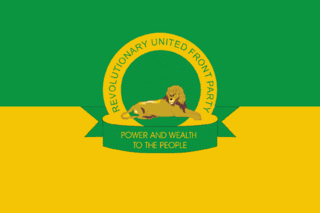
The Revolutionary United Front (RUF) was a rebel group that fought a failed eleven-year war in Sierra Leone, beginning in 1991 and ending in 2002. It later transformed into a political party, which still exists today. The three most senior surviving leaders, Issa Sesay, Morris Kallon and Augustine Gbao, were convicted in February 2009 of war crimes and crimes against humanity.
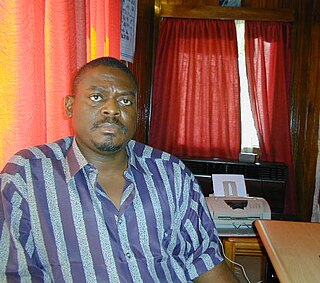
Major Johnny Paul Koroma was a Sierra Leonean military officer who was the head of state of Sierra Leone from May 1997 to February 1998.

Julius Maada Wonie Bio is a Sierra Leonean politician, and the current president of Sierra Leone since 4 April 2018. He is a retired brigadier in the Sierra Leone Army and was the military head of state of Sierra Leone from 16 January 1996 to 29 March 1996, in a military junta government known as the National Provisional Ruling Council (NPRC).
The Forum for African Women Educationalists (FAWE) is a pan-African non-governmental organization founded in 1992 by five women ministers of education to promote girls’ and women's education in sub-Saharan Africa by making sure they have access to schools and are able to complete their studies and fulfill their potential, in line with UNESCO's Education For All movement. The organisation's members include ministers of education, university vice-chancellors, education policy-makers, researchers, gender specialists and human rights activists.

Global Witness is an international NGO established in 1993 that works to break the links between natural resource exploitation, conflict, poverty, corruption, and human rights abuses worldwide. The organisation has offices in London and Washington, D.C.
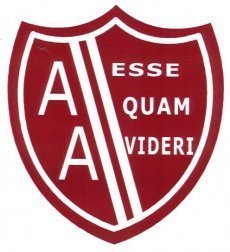
The Albert Academy (AA) is a secondary school in Freetown, Sierra Leone.
Abass Chernor Bundu is a Sierra Leonean politician, diplomat, and the current Speaker of the Sierra Leone House of Parliament, in office since April 25, 2018. Bundu was elected speaker by receiving 70 votes in Parliament. The main opposition the All People's Congress, which won the most seats in Parliament, boycotted the election process in protest and did not nominate a candidate for speaker. Bundu is a veteran politician, and a very close ally and personal friend of Sierra Leone's president Julius Maada Bio.
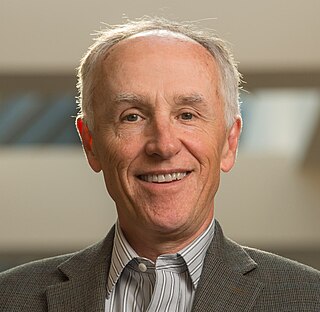
David Cortright is an American scholar and peace activist. He is a Vietnam veteran who is currently Professor Emeritus and special adviser for policy studies at the Keough School of Global Affairs and Kroc Institute for International Peace Studies at the University of Notre Dame, and the author, co-author, editor or co-editor of 22 books. Cortright has a long history of public advocacy for disarmament and the prevention of war.

Haja Zainab Hawa Bangura is a Sierra Leonean politician and social activist who has been serving as the Director-General of the United Nations Office at Nairobi (UNON) since 2018, appointed by United Nations Secretary-General António Guterres. She served as the second United Nations Special Representative on Sexual Violence in Conflict with the rank of Under-Secretary-General of the United Nations from 2012 to 2017, in succession to the first holder of the post, Margot Wallström. In 2017 she was succeeded by Pramila Patten.
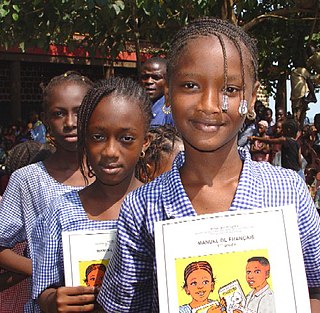
Primary education in Guinea is compulsory for 6 years. In 1997, the gross primary enrolment rate was 54.4 percent and the net primary enrolment rate was 41.8 percent. Public education in Guinea is governed by three ministries: The Ministry for Pre-University Education and Literacy; The Ministry for Technical Education and Occupational Training; and the Ministry for Higher Education, Scientific Research and Innovation.
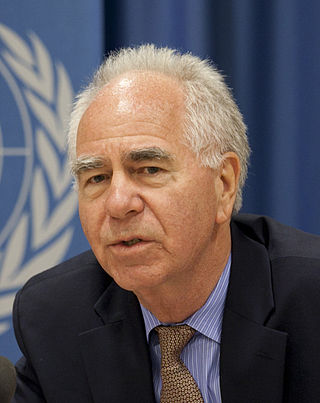
Dr. Neil Boothby is a psychologist and former US Government special advisor and senior coordinator to the USAID administrator on Children in Adversity, and former director of the Program on Forced Migration and Health at the Columbia University Mailman School of Public Health. Currently, he is the founding Director of the Global Center for the Development of the Whole Child at the University of Notre Dame. His research focuses on the psychosocial consequences of organized violence on children. As a senior representative of UNICEF, UNHCR, and Save the Children, he has worked for more than 25 years with children in crises in Africa, Asia, Latin America, and Eastern Europe and is an internationally recognized expert and advocate for children affected by war and displacement. He has received numerous awards for his work on behalf of war-affected children, including the Red Cross International Humanitarian of the Year Award, the Mickey Leland Award, the United Nation's Golden Achievement Award for Social Services, and Duke University's Humanitarian Service Award.
Fula people of Sierra Leone is the fourth major ethnic group in Sierra Leone after the Temne, Mende and Limba ethnic groups and a branch of the Fula people of West Africa. The Fula make up about 3.4% of Sierra Leone's population. The Sierra Leone Fula people settled in the Western Area region of Sierra Leone more than four hundred years ago as settlers from the Fouta Djallon Kingdom that expanded to northern Sierra Leone.
Joseph G. Bock is an American academic and politician, who is currently a professor with Kennesaw State University's Department of Political Science and International Affairs. A member of the Democratic Party, Bock served in the Missouri House of Representatives from 1986 to 1992 and was his party's nominee against Jackie Walorski in 2014.
Roughly 10,000-14,000 child soldiers in Sierra Leone fought between 1991 and 2002 in the Sierra Leone Civil War. Children fought on both sides of the conflict. Nearly half of the Revolutionary United Front (RUF), and a quarter of the governmental armed forces consisted of children aged 8–14 years old.

Zuriel Elise Oduwole is an American education advocate and film maker best known for her works on the advocacy for the education of girls in Africa. Her advocacy has since made her in the summer of 2013 at the age of 10, the youngest person to be profiled by Forbes. In November 2014, at age 12, Zuriel became the world's youngest filmmaker to have a self-produced and self-edited work screened, after her film showed in two movie chains, and then went on to show in Ghana, England, South Africa, and Japan.

Rev. Leeroy Wilfred Kabs Kanu, Esq., also known as Kabs Kanu or Kabs, is an American Christian Reverend, journalist, and newspaper publisher. He is a former high school English teacher, school principal, and lecturer of Educational Psychology. Between 2009 and 2018, he served as Minister Plenipotentiary at the Permanent Mission of Sierra Leone to the United Nations and Coordinator of the African Union Committee of 10. He worked under the presidency of former President Dr. Ernest Bai Koroma of Sierra Leone.

Goalkeepers is an initiative launched by the Bill and Melinda Gates Foundation in 2017 to bring together leaders from around the world to accelerate progress toward achieving the Sustainable Development Goals (SDG). The initiative also provides reports and data flow charts over SDGs progress since 1990.

Richard Konteh is a Sierra Leonean educator, public servant, and businessman.

The COVID-19 pandemic has had a considerable impact on female education. Female education relates to the unequal social norms and the specific forms of discrimination that girls face. In 2018, 130 million girls worldwide were out of school, and only two out of three girls were enrolled in secondary education. The COVID-19 pandemic may further widen the gaps and threatens to disrupt the education of more than 11 million girls. In addition, girls are less likely to have access to the Internet and online learning.














